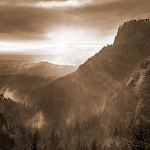Peter on the Water (1)
The close of Matthew 14 presents a scene in the life of our apostle on which we may dwell with profit for a few moments. It furnishes a very fine illustration of his own touching inquiry, "Lord, to whom shall we go?"
Our Lord having fed the multitude, and sent His disciples across the sea, retired into a mountain, to be alone in prayer. In this we have a striking foreshadowing of the present time. Jesus has gone on high. Israel is for the present set aside, but not forgotten. Days of trouble will come — rough seas and stormy skies will fall to the lot of the remnant; but their Messiah will return, and deliver them out of all their troubles. He will bring them to their desired haven, and all will be peace and joy for the Israel of God.
All this is fully unfolded on the page of prophecy, and is of the deepest interest to every lover of God and His Word; but for the present we can merely dwell upon the inspired record concerning Simon Peter, and seek to learn the lesson which that record so forcibly teaches.
"And straightway Jesus constrained His disciples to get into a ship, and to go before Him unto the other side, while He sent the multitudes away. And when He had sent the multitudes away, He went up into a mountain apart to pray; and when the evening was come, He was there alone. But the ship was now in the midst of the sea, tossed with waves, for the wind was contrary. And in the fourth watch of the night Jesus went unto them, walking on the sea. And when the disciples saw Him walking on the sea they were troubled, saying, It is a spirit; and they cried out for fear. But straightway Jesus spake unto them, saying, Be of good cheer; it is I; be not afraid. And Peter answered Him, and said, Lord, if it be Thou, bid me come unto Thee on the water. And He said: Come. And when Peter was come down out of the ship, he walked on the water to go to Jesus. But when he saw the wind boisterous, he was afraid; and beginning to sink, he cried, saying, Lord, save me. And immediately Jesus stretched forth His hand, and caught him, and said unto him, O thou of little faith, wherefore didst thou doubt?"
This brief passage presents to our view in a very forcible way some of the leading features of Simon Peter's character. His zeal, his energy, his real devotedness of heart, no one can for a moment call in question; but these very qualities — beautiful as they surely are — led him not infrequently into a position of such prominence as to render his weak points all the more conspicuous. A man of less zeal, less energy, would have remained on board the ship, and thus avoided Peter's failure and breakdown. Perhaps, too, men of cooler temperament would condemn as unwarrantable rashness Peter's act in leaving the ship, or pronounce it a piece of forwardness which justly deserved a humiliating rebuff.
All this may be so; but we are free to confess that the zeal, energy and devoted self-considering spirit which, in order to avoid the shame and humiliation of a defeat, refuses to take a bold and decided step for Christ. True it is that Peter in the interesting scene now before us completely broke down. But why did he? Was it because he left the ship? No; but because he ceased to look in simple faith to Jesus. Here lay the root of his failure. Had he only kept his eye on the Master, he could have walked on the water though ever so rough. Faith can walk on rough water as easily as on smooth. Nature cannot walk on either. It is not a question of the state of the water, but the state of the heart.
Circumstances have nothing to do with faith, except, indeed, that when difficult and trying, they develop its power and brightness. There was no reason whatever, in the judgement of faith, why Peter should have failed in his walk on the water. Faith looks not at the things that are seen and temporal, but at the things which are unseen and eternal. It endures as seeing Him who is invisible. "Faith is the evidence of things not seen." It lifts the heart above the winds and waves of this rough world, and keeps it in perfect peace, to the praise of Him who is the Giver of faith, as of "every good and perfect gift."
But our beloved apostle utterly failed in faith on the occasion now before us. He, as we, alas! so often do, took his eye off the Lord and fixed it on his surroundings, and as a consequence he immediately began to sink. It must ever be so. We cannot get on for a single moment save as we have the living God as a covering for our eyes. The grand motto for the life of faith is, "Looking off unto Jesus." It is this alone which enables us to "run the race set before us," be the way rough or smooth. When Peter came down out of the ship, it was either Christ or drowning. He might well say at such a moment, "Lord, to whom shall I go?" Whither could he turn? When on board the ship, he had its timbers between him and death, but when on the water he had nothing but Jesus.
And was not He enough? Yes, verily, if only Peter could have trusted Him. This is the point. All things are possible to him that believeth. Storms are hushed into a perfect calm, rough seas become like glass, lofty mountains are levelled, when faith brings the power of God to bear. The greater the difficulties, the brighter the triumphs of faith. It is in the furnace that the real preciousness of faith is displayed. Faith has to do with God, and not with men or things. If we cease to lean on God, we have nothing but a wild, watery waste — a perfect chaos — around us, where nature's resources must hopelessly fail.
All this was proved by Simon Peter when he came down out of the ship to walk on the water; and every child of God and every servant of Christ must prove it in his measure, for Peter's history is full of great practical lessons for us all. If we want to walk above the circumstances of the scene through which we are passing — if we would rise superior to its influences — if we would be able to give an answer, clear, distinct, and decided, to the scepticism, the rationalism and infidelity of the day in which we live — then, assuredly, we must keep the eye of faith firmly fixed on "the Author and Perfecter of faith." It is not by logical skill or intellectual power we shall ever meet the arguments of the infidel, but by an abiding sense, a living and soul-satisfying apprehension, of the all-sufficiency of Christ — Himself — His work — His Word — to meet our every need, our every exigency.
Article series: Peter on the water
Peter on the Water (2)Previous article




